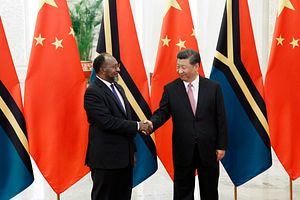Last week Chinese police officers entered Vanuatu on a chartered flight and arrested six people residing in the Pacific Island country. The six were charged with no crimes under Vanuatu law, and no extradition proceedings were conducted. Four of the six arrested held dual Vanuatu and Chinese citizenship. These citizenships were reportedly revoked by the government in Port Vila prior to the six being deported. The event recalled a larger operation two years ago when Chinese police escorted 77 hooded and handcuffed Chinese citizens out of Fiji.
The four detainees who had acquired Vanuatu citizenship had done so through participation in the country’s unique passport sale program. This scheme (which has been specifically aimed at Chinese) has allowed people to buy Vanuatu citizenship for fees ranging from $200,000 to $280,000. The scheme doesn’t require residence or investment in the country and is seen simply as a revenue-raising venture. For participants, the attraction of the scheme is access to a passport with greater global mobility. The most recent Henley Passport Index ranks Vanuatu 43rd in global mobility, with visa-free access to 179 countries. China is ranked 74th, with visa-free access to just 70 countries.
However, as illustrated by the recent arrests, this citizenship scheme doesn’t seem to provide protection under Vanuatu law. The minister of internal affairs stated that he did not know what the six people were accused of, or what agency the Chinese police were from. It seems like an extraordinary case of a foreign power being able to act with impunity on Vanuatu’s territory.
Pacific Island states are currently trying to navigate the rise of a new great power with growing global reach. China’s ascension and its increased capabilities can offer considerable opportunities to Pacific states, but can also present new challenges and compromises. These are states that have significant logistical hurdles to overcome and limited resources to do so. Leveraging their sovereignty can be a canny tactic to move conditions in their favor. There are undoubtedly trade-offs factored into theses approaches, but what Vanuatu seems to have traded in this case is sovereignty itself.
This is the risk of attempting to leverage sovereignty as a tactic with a state that is organized in an unconventional manner, one that lacks the predictability of other powers Vanuatu has significant relations with. The Chinese government acts in the interests of the Communist Party, and these actions aren’t constitutionally bound in the ways the actions of a state like Australia are. Therefore, Chinese efforts and motives can be more difficult to decipher than states that are constrained by the rule of law and organized with greater transparency. It makes leveraging sovereignty as a tactic a far more complicated pursuit, and a path littered with potential mines. Vanuatu seems to have stumbled upon one of these mines with its scheme to sell citizenship sans protection.
Beijing has stated that it is not seeking a sphere of influence in the Pacific. The point is arguable given that the Pacific remains the largest region of states that formally recognize Taiwan and this is an issue that China sees as an existential concern. But whether China is seeking influence or not, its interactions with Pacific Island states are influential. China’s rise has shifted behavior in the region, as Pacific Island countries seek new interactions and opportunities.
But China doesn’t seem to have shifted its own behavior in recognition of its expanding power. The nature of the regime is not confined to its own territory. If a transnational crime was being committed in China from Vanuatu, Beijing could have approached this issue through the processes of Vanuatu’s laws. Instead, Beijing simply sought to extend its own approach to suspected criminal activity into Vanuatu’s territory. It was a bold course of action that will continue to bring suspicion about whether Beijing can act as a responsible superpower.
There have subsequently been calls from politicians in Vanuatu to immediately review the sale of citizenship. The country’s first president, Ati George Sokomanu, has stated that the scheme is demeaning to those who struggled for Vanuatu’s independence. For Vanuatu there may have to be an acceptance that it overplayed its hand in using passports as a revenue-raising measure. It was a cynical move that ultimately undermined the very sovereignty it was trying to leverage. The situation will undoubtedly reverberate across the Pacific, as other countries seek to weigh the opportunities and challenges of China’s expanding power.

































